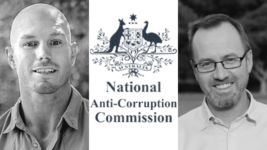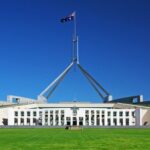National Anti-Corruption Commission Hearings Will Continue to Be Held in Secret

As an omnibus bill passed the Senate on 10 October that clarified within various pieces of legislation, including the National Anti-Corruption Commission Act 2022 (Cth), that digital assets can be seized in regard to proceeds of crime cases, Senators David Pocock and Jacqui Lambie raised a further amendment aimed at resolving the glaring issue around the secrecy shrouding NACC hearings.
In raising the motion, Independent Senator Pocock told the chamber that during the committee inquiry process into the establishment of a national anticorruption watchdog, evidence from officials involved in the running of state integrity bodies, like the NSW ICAC (the Independent Commission Against Corruption), maintained “there should be a presumption towards having public hearings”.
But employment minister Murray Watt responded that the further change was not warranted, as he asserted that the Albanese government would not be considering public anticorruption hearings at the NACC, because the watchdog commissioner, currently former NSW Supreme Court Justice Paul Brereton, already has the discretion to hold public hearings under exceptional circumstances.
The beleaguered NACC has come under much consternation of late, following its 6 June decision not to pursue the recommendation of the Royal Commission into the Robodebt Scheme to further investigate the key outstanding corruption matter that the watchdog was anticipated to inquire into, especially as a sealed section of its report named six public officials warranting extra scrutiny.
And this attempt to tear down NACC secrecy, which was supported by the entire crossbench but voted down by the majors, came not only as the new watchdog is currently under investigation for corruption due to its refusal to investigate Robodebt, but, on the day prior, the NACC had finished with another controversial matter, with that inquiry into the Paladin affair turning up no wrongdoing.
An exceptionally private watchdog
“We see that the Labor Party sided with the Coalition to set up the legislation in a way that we have no real oversight of what is happening in the NACC,” Pocock said in raising the amendment last Thursday. “There’s a presumption towards having private hearings.”
The Independent for the ACT added that public confidence in the NACC “has clearly been shaken”, and “real concerns… particularly in relation to the Robodebt” had led to the establishment of a corruption inquiry into the anticorruption watchdog mid-year, which Greens Senator David Shoebridge and other crossbenchers had advocated for.
In response to long-term campaigning for “a federal ICAC”, then Morrison government attorney general Christian Porter produced his version of a national integrity commission in late 2018, which was condemned as a toothless watchdog, precisely because he proposed hearings relating to politicians be held in private, while those involving law enforcement would be publicly heard.
Current attorney general and back then, shadow minister Mark Dreyfus had been promising “a watchdog with teeth” ever since Porter’s version was publicly shot down.
Yet, the key gripe with it, that half its hearings would be held behind closed doors, went on to become the standard setting for all hearings before the NACC unless exceptional circumstances are shown to warrant otherwise.
Minister Watt countered Pocock’s assertions, stating that the government had struck the right balance in allowing for public hearings in certain circumstances. But the independent added that “an incredibly high bar” had been set for instances in which open door hearings might occur, and if this continues, “there will basically never be public hearings”.
The publicly favoured amendment
Section 73 of the National Anti-Corruption Commission Act (Cth) ensures that a NACC “hearing must be held in private, unless the commissioner decides to hold the hearing, or part of the hearing, in public”.
In order to hold public hearings, the office bearer must be satisfied that “exceptional circumstances justify” it and that “it is in the public interest to do so”.
The Pocock-Lambie amendment sought to amend the section so that it allowed for the commissioner to “decide to hold a hearing, or part of a hearing, in public if the commissioner is satisfied that it is in the public interest to do so”.
However, this was voted down, with 26 against the change, while 18 were in favour.
The Paladin affair
The Pocock motion was raised the day after the NACC published the findings of its inquiry into the Paladin Affair, which related to cash payments made to a former Home Affairs executive by a close relative, Craig Thrupp in 2017, at the same time that his company Paladin Holdings was securing a contract to manage garrison services at Manus Island immigration centre with Home Affairs.
A successful Paladin was then paid half a billion dollars to manage services at the Australian detention centre over 2017 to 2019. However, there were questions and criticisms relating to the closed tender process, which saw Paladin securing the contract at a cost of $1,600 a day per refugee, when services could have been provided by comparable companies at around $100 a day per person.
At the time of the tender process, Thrupp’s relation at Home Affairs was also the partner of Carl Delaney, who was a former Home Affairs executive then assisting Paladin in the tender process. Delaney went on to become a Paladin director in May 2019, after he’d mentored and guided the company through the tender process, which provided it was successful in securing the contract.
Referred to by the pseudonym Anne Brown in the NACC report, the former Home Affairs senior executive received over $215,000 from Thrupp via Paladin over 2017, in order to pay off her mortgage, while she also invoiced Paladin for “management and consulting services” over that same year, which amounted to more than $191,000 and she subsequently received payment of $194,000.
Thrupp also funded the purchase of a three-bedroom apartment in the names of Brown and Delaney in May 2018, for the price of $902,000. And Paladin then leased the property from them at $1,000 a week, so that its personnel could reside in it when visiting Canberra, as, at the time, the company was paying $20,000 annually on accommodation, and this $52,000 deal was considered a solution.
The Australian Financial Review broke the news of the Paladin Affair back in 2019. Yet, five years later, as the case was finally the subject of official scrutiny, the NACC determined this month that the allegations that Brown abused her office as a Home Affairs employee “to dishonestly obtain a benefit for herself” or that she assisted Paladin in securing the contract were unsubstantiated.
Lacking “sunshine and transparency”
Senator Shoebridge, who was in favour of the amendment, explained to the chamber that federal Labor had negotiated away the capacity for the corruption watchdog to hold its hearings in public when it facilitated Coalition amendments to the NACC legislation, which “shut down public hearings to put in place this artificial test of exceptional circumstances”.
In opening the door to public hearings, the Pocock-Lambie amendment was seeking the restoration of public confidence in the watchdog, which appears to have been in mind when it decided to publish its report into Paladin in an attempt to assist in “clearing the air” at a time when many questions are being raised about the NACC, as it’s already the subject of an official inquiry.
The NACC is under investigation prior to its one-year anniversary, as the Inspector of the National Anti-Corruption Commission (INACC) Gail Furness SC decided, after having received over 900 complaints alleging “corrupt conduct or maladministration” in the week following the 6 June NACC decision not to investigate Robodebt, that such an inquiry was warranted.
The NACC last month released its figures to date, which reveal that the body is currently conducting 32 preliminary hearings, 28 corruption investigations, it’s monitoring 18 inquiries by other agencies, has six matters before the courts and it has 480 referrals pending.
Shoebridge further questioned minister Watt as to what happened to the federal Labor that in opposition had supported a 2019 Greens anticorruption watchdog bill “that had open discretions for public hearings”, so that it was successfully passed by the upper house.
“What happened between Labor in opposition,” Senator Shoebridge asked Watt, “and Labor getting into government and suddenly siding with Peter Dutton to put in an ‘exceptional circumstances’ test?”
“Is it that, now you’re in government, you no longer support sunshine and transparency?” the Greens senator further queried.







